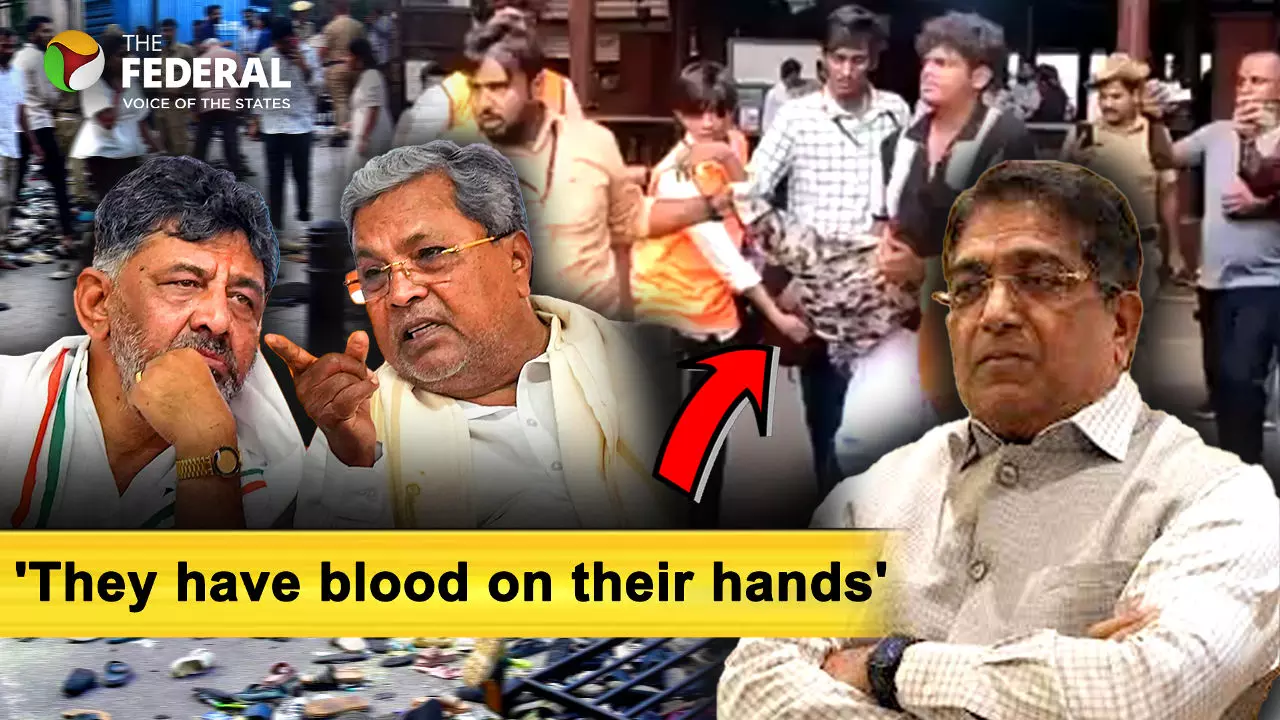
‘Blood on their hands’: Ex-top cop Bhaskar Rao blames govt for Bengaluru stampede
Former Bengaluru CP Bhaskar Rao, who is now a BJP leader, blames the Karnataka government for the tragedy, says officers have been made scapegoats

Two days after the tragic deaths of 11 youngsters in a stampede outside Bengaluru’s Chinnaswamy Stadium on June 4, Bengaluru City Police Commissioner B Dayananda and four other senior police officers — three of them IPS officers — were suspended, on charge of “substantial dereliction of duty”.
Also suspended was Chief Minister Siddaramaiah’s political secretary K Govindaraj, while Hemanth Nimbalkar, Karnataka’s Additional Director General of Police (Intelligence) was transferred. Questions have been raised in many quarters whether these men have simply been scapegoated while the real culprits shift the blame.
Former Bengaluru Commissioner of Police Bhaskar Rao, who is now a BJP politician, in a no-holds-barred interview to The Federal’s Abhijit Singh Bhambra, laid bare his thoughts. Excerpts from the interview:
What’s your first reaction to the tragic stampede in Bengaluru on June 4?
The decision by the government of Karnataka, BCCI, IPL, RCB, the Karnataka State Cricket Association, and the event manager DNA to organize a victory march and celebration within 24 hours was hurried, unplanned, and ill-conceived. The Bengaluru City Police were already overstretched, having been on duty all night. Players were flown in on a chartered flight from Ahmedabad, housed in a five-star hotel, and then paraded on the steps of Vidhan Soudha—a prohibited area.
Even as fans were being felicitated at the KCA stadium, the stampede had already occurred and deaths had happened. Shockingly, the celebrations continued. The chief minister and deputy chief minister seemed more interested in basking in the limelight and trying to connect with youth than acknowledging the tragedy unfolding outside. Their actions have resulted in a mockery of governance and blood on their hands.
You tweeted that this was one of the darkest days for Karnataka Police. Why do you feel the suspension of Police Commissioner B Dayananda and others is unfair?
The Police Commissioner is like a banyan tree under which other officers function—Additional Commissioners, Joint Commissioners, ACPs, and Inspectors. The post is not just administrative but strategic, involving confidential decisions in sync with the government.
Also read: Bengaluru stampede: Is Congress digging its own grave in Karnataka?
If the government believes Dayananda is inefficient and suspends him, it’s an indirect admission of its own failure. Everyone knows who the real culprits are.
So you're saying the government has made Dayananda a scapegoat?
Not just saying—it’s already happened. The government blamed Dayananda, his Additional Commissioner, Deputy Commissioner, ACP, and even the local Inspector. All have been suspended. Worse, the Inspector of Cubbon Park Police Station was made to file a complaint against IPL and KCA. That complaint won’t stand in court. How can someone already deemed guilty file a credible FIR? The whole legal and political strategy is flawed.
Given the arrests and FIRs, do you expect any real progress or accountability?
Take it from me: in a week, everything will be forgotten—except the pain of the families who lost their loved ones. Media attention might sustain interest for a few days, but justice will not be served.
Also read: Bengaluru stampede a case of sub-nationalistic passion fuelling sporting frenzy
You’ve been outspoken post-retirement, especially in your criticism of the Congress government. What are the key governance failures you see in Karnataka right now?
Congress came to power with a landslide—136 out of 224 seats. They made big promises and the public bought into them. But governance has collapsed.
I served under Siddaramaiah during 2013–2018 and found him to be a much better chief minister than he is today. Now, he seems completely constrained by the guarantee schemes, which I doubt he even personally supports given his economic mindset.
What should the state government have ideally done after the stampede?
The government should have approached the Chief Justice to appoint a sitting High Court judge to investigate. That judge should be given full authority and resources to complete an inquiry within 1–1.5 months and identify those responsible. No political interference—just let the judiciary do its job.
Was continuing the celebration after deaths had occurred an inhuman move?
Absolutely. There was a complete lack of humanity and mindfulness. Even before the main event began at the stadium, the stampede had already happened.
Two people were declared dead at Bowering Hospital as early as 4.33 pm and 4.36 pm. Despite knowing this, the celebrations continued after 5 pm with shawls, garlands, and crackers. How can you rejoice when fans are dying outside?
Also read: Bengaluru stampede turns spotlight on 'accountability gaps' by event firms in Chennai
Does punishing a senior officer demoralize the police force?
Absolutely. It breaks the spirit of the department. Officers become anchorless and risk-averse. I always told my subordinates that police work requires instant decisions. Like Sania Mirza or Virat Kohli, our mistakes are instantly visible.
Unlike judges or IAS officers whose errors may take years to surface, a police officer’s mistake is caught in seconds. We must be quick, and we must be right. But for that, we need backing—not betrayal.
Also read: RCB stampede, an unfortunate reality check for cricket-crazy fans
So was the police force given enough time or resources to prepare for such a crowd?
Clearly not. The entire event was rushed. And in the tussle between the state government and the police, the latter has been left vulnerable.
(The content above has been generated using a fine-tuned AI model. To ensure accuracy, quality, and editorial integrity, we employ a Human-In-The-Loop (HITL) process. While AI assists in creating the initial draft, our experienced editorial team carefully reviews, edits, and refines the content before publication. At The Federal, we combine the efficiency of AI with the expertise of human editors to deliver reliable and insightful journalism.)

